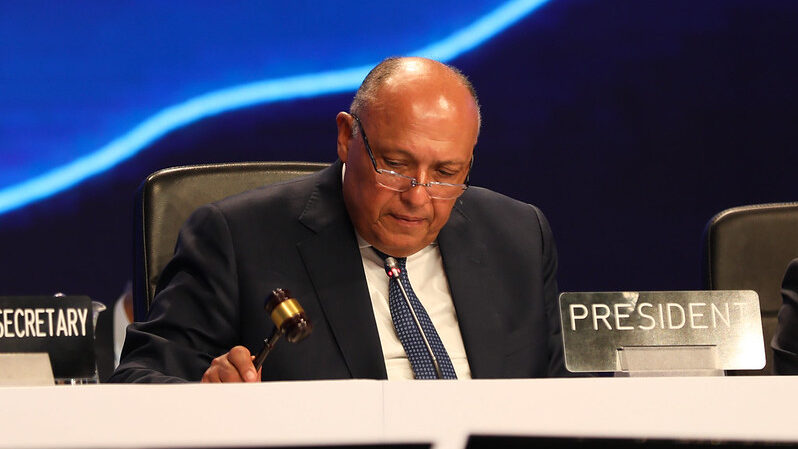Shortly after the dawn call to prayer sounded across Sharm el-Sheikh, Egypt, on Sunday, negotiators adopted a climate deal to polite applause.
It was an anticlimactic end to a summit that secured a breakthrough on support for climate victims, yet did nothing to stop oil and gas expansion fueling further climate chaos.
Throughout the two-week Cop27 summit, the Egyptian presidency largely kept political confrontations out of public view. There were none of the plenary fights or intense huddles of negotiators that typically characterise the last hours of these conferences.
US special envoy John Kerry missed the finish, as he was confined to his hotel room with Covid. His deputies left the room before the formalities had concluded. Looking exhausted after two sleepless nights of overtime, they declined to comment on the outcome.
“What we have in front of us is not enough of a step forward for our planet,” said the EU’s Frans Timmermans in the plenary – but he did not carry out a threat to walk out. He “reluctantly” accepted the deal as it would be a “huge mistake” to kill the loss and damage fund developing countries had fought for.
Analysis: What was decided at Cop27 climate talks in Sharm el-Sheikh?
There was a burst of optimism on Saturday afternoon as the EU and G77 bloc of developing countries agreed terms for a loss and damage fund. Campaigners hailed it as offering hope for those on the front lines of climate impacts, after years of being ignored.
“A mission thirty years in the making has been accomplished,” said Antigua and Barbuda’s environment minister Molwyn Joseph, chair of the Alliance of Small Island States (Aosis).
It tees up a big fight for next year’s Cop28 over who pays into and who benefits from the fund. Rich countries are pushing for China to chip in and finance to be targeted at “vulnerable” countries.
Pakistan’s climate Sherry Rehman, on behalf of G77 and China, told the plenary: “The establishment of a fund is not about dispensing charity, it is a down payment on the longer investment in our joint future.”
That was followed by protracted – but unproductive – wrangling behind closed doors over plans to halt global warming. The final text barely changed from the previous draft, except to back “low-emissions” energy as well as renewables – potentially a loophole for gas.
Cop27: EU-developing countries’ deal offers hope to climate victims
India had proposed earlier in the week to extend to other fossil fuels Cop26’s groundbreaking agreement to phase down coal. A broad coalition of more than 80 countries took up the call, but the Egyptian presidency refused to include it in the cover statement.
Indeed, Egypt had endorsed fossil gas as “the perfect solution” to the energy crisis and encouraged deals on the sidelines. Saudi Arabia and Russia strongly opposed any reference to oil and gas, sources in closed meetings reported.
“It is more than frustrating to see overdue steps on mitigation and the phase-out of fossile energies being stonewalled by a number of large emitters and oil producers,” said German foreign minister Annalena Baerbock. “The world is losing valuable time to move towards 1.5 degrees.”
Despite a lack of consensus on the issue, UN climate chief Simon Stiell used his closing speech to say coal, oil and gas were on the way out. “[The text] gives the key political signals that indicate a phase down of all fossil fuels is happening,” he claimed.
Cop27 president Sameh Shoukry told the plenary that negotiations had “not [been] easy”. “We worked around the clock,” he said, with talks being “strained and sometimes tense”. But “we rose to the occasion,” he said.
